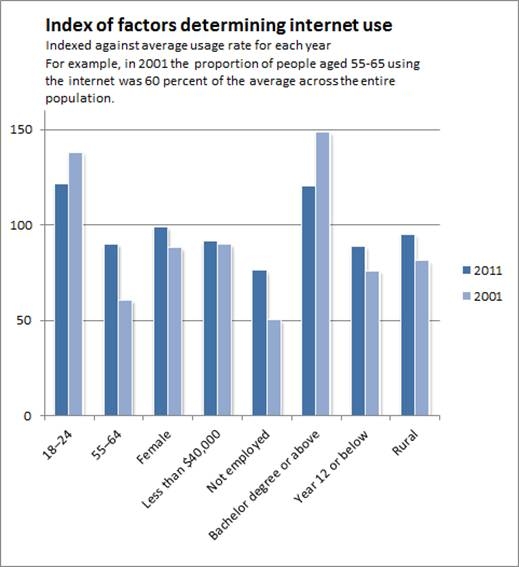By the numbers: closing the digital divide

On the face of it there was nothing too surprising about the latest statistics from the Australian Bureau of Statistics (ABS) on the use of internet. The ABS's "Household Use of Information Technology" report tells us how many people had accessed the internet over the previous 12 months — apparently 21 per cent of us didn't.
"Who are these laggards?" one might ask. Well, 67 per cent of them aren't working and 74 per cent have no education beyond Year 12. So is it economic disparity that is keeping people off the net? Or is it the other way round? If they got online they could access Seek and get a job.

(Credit: Phil Dobbie/ZDNet Australia)
Charting index values against averages is one way of looking at which sectors are still disadvantaged. So to explain: in the graph above, anything over 100 shows a group with a higher-than-average proportion of internet users. Back in 2001, 18-24 year olds, for example, were far more likely than the average person to be using the internet, but these days they are closer to the norm (100).
That's because older groups have caught up: 55-64 year olds are almost as likely as anyone to be an internet user.
It's clear to see that in most categories the dark blue bar is moving closer to 100, indicating that the variation from the average is diminishing and internet use is becoming more ubiquitous. Even folks in rural Australia are close to the average mark, despite all our protestations about needing the NBN to fix the regional divide.
It's encouraging news. Over the last 10 years, the internet has gone from being the domain (excuse the pun) of wealthy, educated urbanites (used by less than half the population), to something frequented by 80 per cent of us, touching almost all sectors of the community. Only those aged 65 or over (an index of 35) are really resisting the urge.
All of which brings us to an interesting question: if it's poverty that is stopping people from accessing the internet, shouldn't the government have insisted that NBN Co offer a free or low-cost walled garden of public content, accessible by all? Wouldn't that do a better job of closing the digital divide, which is clearly more economic than geographic?
Without such an approach, however much money is spent, we'll do little to move beyond the current levels of penetration.